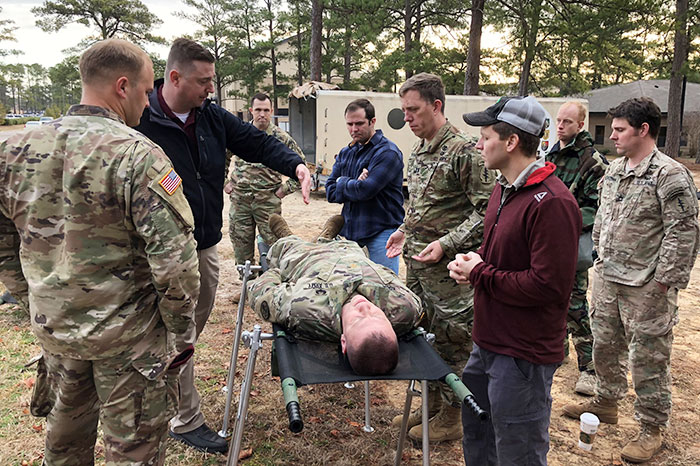Globetrotting Team at USAMRICD Takes Chemical Defense Anywhere, Everywhere

If the U.S. Army Medical Research and Development Command is always on the move – always innovating, always pushing the boundaries of possibility – then the Chemical Casualty Care Division Mobile Training Team at USAMARDC's U.S. Army Medical Research Institute of Chemical Defense is, in many ways, the physical embodiment of that concept. Created more than 25 years ago to support the unique infrastructure of the U.S. military's medical apparatus, the CCCD Mobile Training Team is, in short, the team to call when preparing for the most volatile of situations.
"We've always known this is a highly-important subject area," says Daniel Boehm, a field medical education specialist with the CCCD Mobile Training Team for more than two decades, "but this type of preparedness is one of those things that people do not really think about until they need it."
The team's mission is relatively simple: they travel across the globe teaching any number of U.S. Department of Defense entities how to manage casualties stemming from potential chemical and biological threats. In just a few weeks from now, in fact, they'll pack their bags for a date in San Diego, California, where they've been tasked with teaching leadership aboard the USNS Mercy – a ship with a one thousand hospital bed capacity – how to operate in case of a similar emergency.
For Boehm, a Soldier himself who served as a combat medic instructor in the Army for sixteen years, the course is not only a way to carry out USAMRICD's mission – which, among an array of other objectives, also includes the delivery of chemical and biological threat training – it's also a way to equip Service Members with the very latest safety information in a field where general health security recommendations are constantly evolving.
"What we've seen is that there is a training gap between what the perceived knowledge base is and what the actual knowledge is, so what we do is erase the board and start from scratch," says Boehm, who's been a part of the mobile training team since 1998. "Then, within that framework, the courses we provide via the team are tailored to meet the needs of whatever the audience might be."
For the crew aboard the Mercy, that means Boehm and his three-person team will tailor the casualty management plan to fit the ship's exact specifications. Broadly speaking, the three-day course is designed to emphasize the pathophysiology of certain chemical and biological agents, and then operationalize that information to help put it into proper context. In practice, the course will focus on balancing both the proper management of casualties exposed to certain chemical agents while also maintaining function of the ship's normal capacity as a hospital. Additional topics to be covered will include, for instance, where both "contaminated" and "clean" patients should be placed on the Mercy given the ship's unique layout.
The course itself will be administered while the ship is docked in port, with the leadership then scheduled to conduct a full-scale drill based on those teachings during a week-long training exercise immediately following.
"There's certain areas in which we'll emphasize how to do this particular decontamination operation on a ship versus land-based care," says Boehm. "We'll have folks go through and actually function as a team to set up a patient decontamination station; which will itself be going through all the logistical processes of how, exactly, you task organize a group of novice personnel who may not be familiar with some of these key concepts."
Notably, the course being taught by Boehm and his crew – which includes, at all times, at least one member of USAMRDC's U.S. Army Medical Research Institute of Infectious Diseases – is the laboratory's celebrated Medical Management of Chemical and Biological Casualties course. Most of the individuals who take the MCBC training (including physicians, nurses, and emergency medical technicians, to name a few) do so to satisfy core educational requirements or to maintain key qualifications at various installations across the Army. Both USAMRICD and USAMRIID received substantial praise from the command in late 2020 for reimagining the MCBC coursework – via modified presentation style and the inclusion of video segments – for translation onto a virtual platform due to the then-raging novel coronavirus pandemic. The effort stands as yet another feather in the cap of both laboratories. "Having this kind of knowledge is very important to unit readiness and preparedness," said Coleman Erwin, training and research nurse with the USAMRIID Division of Medicine, of the accomplishment at the time. "It also instills a greater sense of confidence in our medical professionals."
For Boehm, instilling that type of confidence is just part of a regular day's work. After a near-lifetime at USAMRICD – first as a Soldier and now as a civilian employee – such an intricate and integral career path has given him a unique perspective on the breadth of USAMRDC's global impact.
"At this point, I think the list of places where we haven't been would be easier to list than the places we have been," he says. "It's always been an absolute treat to be able to go and train our folks, to train partner nations – it really has been fascinating to be involved with the planning and delivery of these courses."














